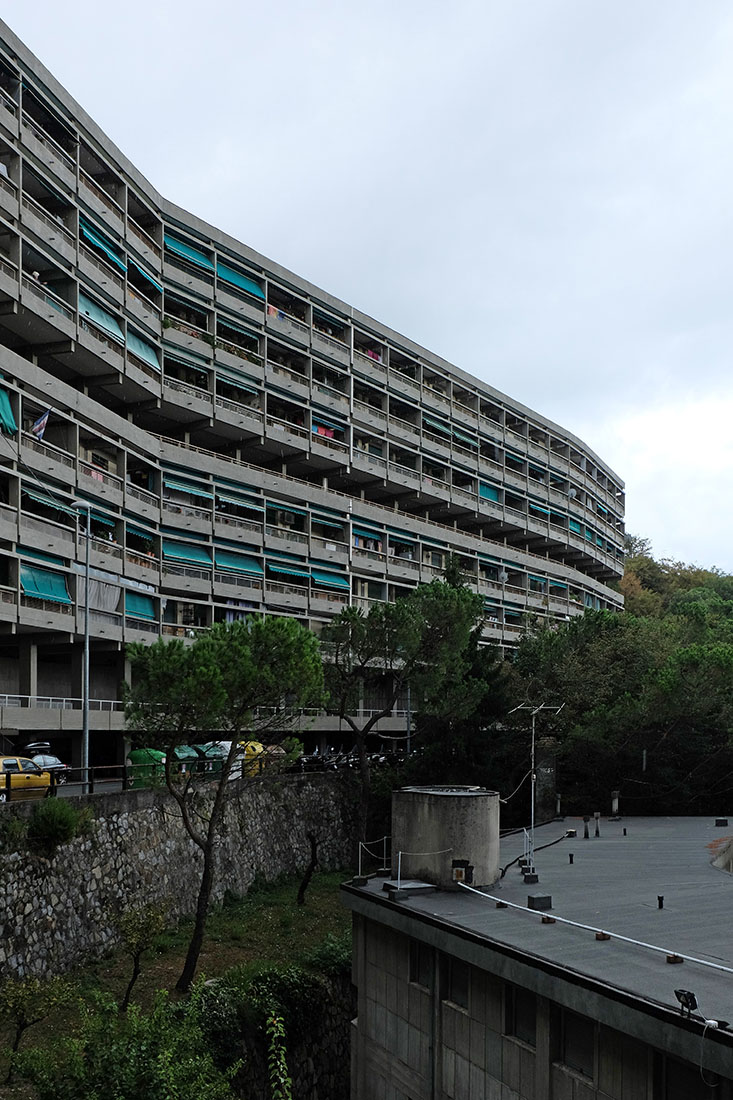 |
 |
 |
 |


Forte Quezzi Housing
Via Leonardo Fea 57, Genoa
1958 - 1968
The
Forte Quezzi residential complex in Genoa was built in the 1960s for
the social housing association INA-Casa, and is called "Biscione",
which means as much as big snake. The gigantic residential complex
consists of five houses of more than 300 meters length each, and is
located on the mountains above the port of Genoa, a city in northern
Italy. The name "Biscione" refers to the enormous length and shape of
the buildings winding along the slopes and nestling on the terrain. Due
to its position at the top of the mountain slope, the complex offers
generous views of the sea. Within the residential complex, which is
located in the Marassi and Quezzi districts, a modern church, which
reminds of a ship's bow, was built in the 1990s. The streets running
along the residential blocks are dedicated to four Italian explorers
and scholars: Lamberto Loria, Leonardo Fea, Elio Modigliani and Carlo
Emery. A total of 35 architects were involved in the planning of this
district. An architects group around Robaldo Morozzo della Rocca was
responsible for the low queue, while another group around Angelo
Sibilla took care of the building with the 4: 2 poroportions. Luigi Carlo Daneri
designed the top building. This building is based on a string of paired
apartments and has a total of 34 stairs. The façade shows a continuous
series of identical loggias, and is divided by a horizontal incision at
mid-height. This incision is formed as an internal promenade. Visually,
these measures are used to summarize three floors each.
Die Forte Quezzi Wohnanlage in Genua wurde in den 1960er Jahren für die soziale Wohnbauorganisation INA-Casa erstellt, und wird "Biscione" genannt, was soviel wie grosse Natter bedeutet. Die gigantische Wohnanlage besteht aus fünf Wohnhäusern von jeweils mehr als 300 Metern Länge, und befindet sich an den Berghängen über der norditalienischen Hafenstadt Genua. Der Name "Biscione" bezieht sich auf die enorme Länge und die Form der Gebäude, welche sich den Hängen entlang winden, und sich an das Gelände schmiegen. Durch die Lage oben am Berghang, bietet die Anlage grosszügige Ausblicke auf das Meer. Innerhalb des Wohnkomplexes, welcher sich in den Stadtteilen Marassi und Quezzi befindet, wurde in den 1990er Jahren eine moderne Kirche, welche an einen Schiffsbug erinnert, gebaut. Die Strassen welche entlang der Wohnblöcke verlaufen sind nach vier italienischen Entdeckern und Gelehrten benannt: Lamberto Loria, Leonardo Fea, Elio Modigliani und Carlo Emery. In die Planung dieses Quartiers waren insgesamt 35 Architekten involviert. Eine Architektengruppe rund um Robaldo Morozzo della Rocca war für die niedrige Schlange verantwortlich, während dem sich eine weitere Gruppe rund um Angelo Sibilla um den Baukörper mit der 4:2 Gliederung kümmerte. Luigi Carlo Daneri entwarf das oberste Gebäude. Dieses Gebäude basiert auf einer Aneinanderreihung von Zweispännern und weist insgesamt 34 Treppenhäuser auf. Die Fassade zeigt eine kontinuierliche Reihe identischer Loggien, und wird auf mittlerer Höhe durch einen horizontalen Einschnitt gegliedert. Dieser Einschnitt ist als eine interne Promenade ausgebildet. Optisch werden durch diese Massnahme je drei Stockwerke zusammengefasst.
Die Forte Quezzi Wohnanlage in Genua wurde in den 1960er Jahren für die soziale Wohnbauorganisation INA-Casa erstellt, und wird "Biscione" genannt, was soviel wie grosse Natter bedeutet. Die gigantische Wohnanlage besteht aus fünf Wohnhäusern von jeweils mehr als 300 Metern Länge, und befindet sich an den Berghängen über der norditalienischen Hafenstadt Genua. Der Name "Biscione" bezieht sich auf die enorme Länge und die Form der Gebäude, welche sich den Hängen entlang winden, und sich an das Gelände schmiegen. Durch die Lage oben am Berghang, bietet die Anlage grosszügige Ausblicke auf das Meer. Innerhalb des Wohnkomplexes, welcher sich in den Stadtteilen Marassi und Quezzi befindet, wurde in den 1990er Jahren eine moderne Kirche, welche an einen Schiffsbug erinnert, gebaut. Die Strassen welche entlang der Wohnblöcke verlaufen sind nach vier italienischen Entdeckern und Gelehrten benannt: Lamberto Loria, Leonardo Fea, Elio Modigliani und Carlo Emery. In die Planung dieses Quartiers waren insgesamt 35 Architekten involviert. Eine Architektengruppe rund um Robaldo Morozzo della Rocca war für die niedrige Schlange verantwortlich, während dem sich eine weitere Gruppe rund um Angelo Sibilla um den Baukörper mit der 4:2 Gliederung kümmerte. Luigi Carlo Daneri entwarf das oberste Gebäude. Dieses Gebäude basiert auf einer Aneinanderreihung von Zweispännern und weist insgesamt 34 Treppenhäuser auf. Die Fassade zeigt eine kontinuierliche Reihe identischer Loggien, und wird auf mittlerer Höhe durch einen horizontalen Einschnitt gegliedert. Dieser Einschnitt ist als eine interne Promenade ausgebildet. Optisch werden durch diese Massnahme je drei Stockwerke zusammengefasst.